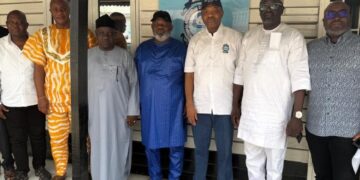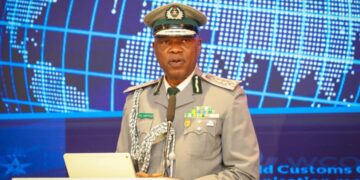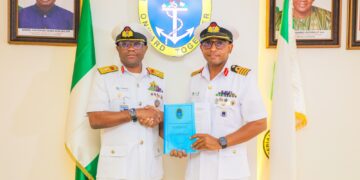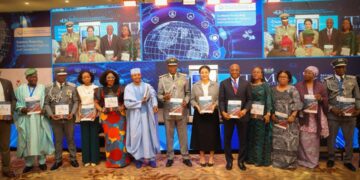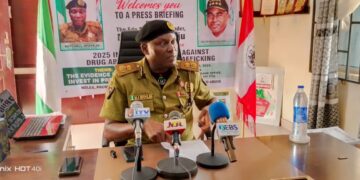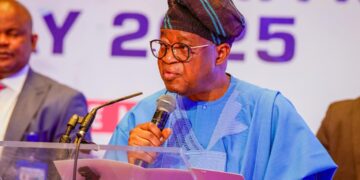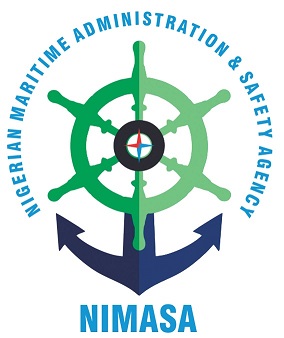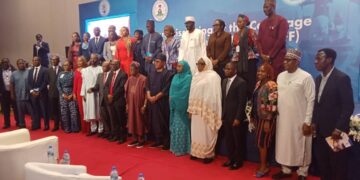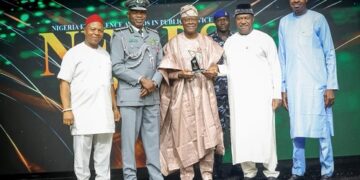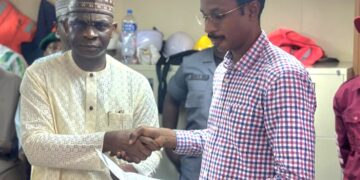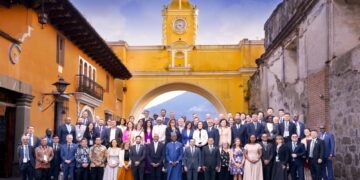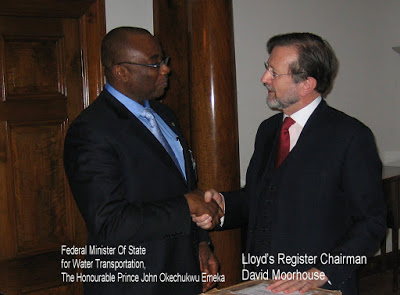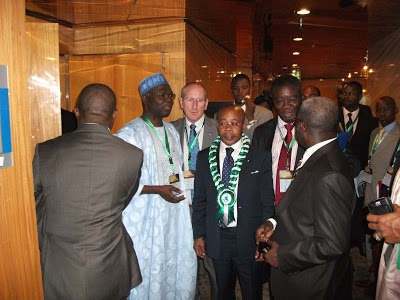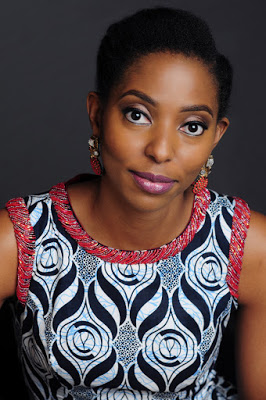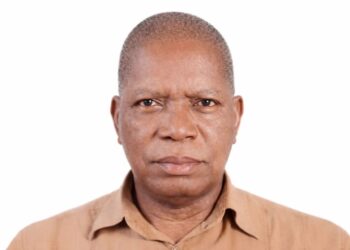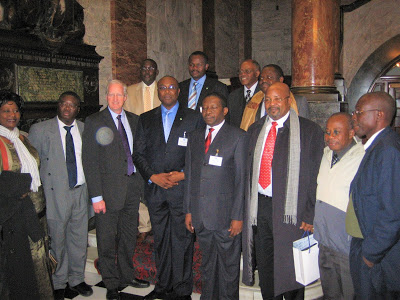 |
| Nigeria’s delegation to Lloyd’s Register HQ, London in 2007 |
Various opinions concerning Nigeria’s
performance at the last International Maritime Organisation (IMO) Council
election for Category C have raised a discourse, which has made it imperative
for the country to address a number of issues as observed.
performance at the last International Maritime Organisation (IMO) Council
election for Category C have raised a discourse, which has made it imperative
for the country to address a number of issues as observed.
For that discourse, marine engineer, Emmanuel
Ilori, states clearly that Nigeria must put its vast technical resources into
required perspective in order to make real impact satisfactory to the maritime
sector at the level of the IMO.
Ilori, states clearly that Nigeria must put its vast technical resources into
required perspective in order to make real impact satisfactory to the maritime
sector at the level of the IMO.
It is important to note that Ilori once
worked with Lloyd’s Register, in the classification committee, with
a job demand of collecting technical information to build knowledge database
for the shipping industry. At that point, his core duty helped people to understand
ships and their relationship, and operations better.
From the position of depth knowledge of the
technical requirement of a maritime nation, Ilori gives quality insights on
what Nigeria must begin to do from now if the country must apply to contest and scale through for the category ‘C’ membership slot in the next two years.
technical requirement of a maritime nation, Ilori gives quality insights on
what Nigeria must begin to do from now if the country must apply to contest and scale through for the category ‘C’ membership slot in the next two years.
What
is your view of Nigeria’s performance at the last IMO Council election into the
Category C seat?
is your view of Nigeria’s performance at the last IMO Council election into the
Category C seat?
Nigeria losing the IMO Council seat should
not really be seen as a failure per se, because if you remember, Nigeria used
to be a prairie State in terms of the IMO and the global maritime community
until the present administration came on board. Then, the effort has been to
raise the Nigerian profile and turn the negative perception to a positive
perception for Nigeria. By and large, we have succeeded in doing that, and
these are all through political efforts. We have raised the Nigerian maritime
political status significantly; we became the president of the Association of
African Maritime Administrations (AAMA) and hosted a few conferences. Those
were all part of raising awareness about the importance of the maritime. They are all political efforts. But, the IMO is not just a political organisation.
It is basically a technical organisation, and by and large, IMO supports global
maritime economy. So, when Nigeria went for the election, her focus was in
leveraging on her political prowess. The result of the election is telling us
that have we not exhausted the political goodwill that we had? What else have
we failed to do in terms of the other two legs? Because the IMO election stands
firmly on three legs; what have you done about your maritime economic
achievement, how sound are you on maritime technical aspects? And these are the
areas where there are shortfalls at the moment. So, it is time for us to
rethink how strategically we will engage globally on the other two platforms.
not really be seen as a failure per se, because if you remember, Nigeria used
to be a prairie State in terms of the IMO and the global maritime community
until the present administration came on board. Then, the effort has been to
raise the Nigerian profile and turn the negative perception to a positive
perception for Nigeria. By and large, we have succeeded in doing that, and
these are all through political efforts. We have raised the Nigerian maritime
political status significantly; we became the president of the Association of
African Maritime Administrations (AAMA) and hosted a few conferences. Those
were all part of raising awareness about the importance of the maritime. They are all political efforts. But, the IMO is not just a political organisation.
It is basically a technical organisation, and by and large, IMO supports global
maritime economy. So, when Nigeria went for the election, her focus was in
leveraging on her political prowess. The result of the election is telling us
that have we not exhausted the political goodwill that we had? What else have
we failed to do in terms of the other two legs? Because the IMO election stands
firmly on three legs; what have you done about your maritime economic
achievement, how sound are you on maritime technical aspects? And these are the
areas where there are shortfalls at the moment. So, it is time for us to
rethink how strategically we will engage globally on the other two platforms.
Nigeria’s
performance for same position back in time?
performance for same position back in time?
Back in 2007 when we won the election, in
as much as we went politically, Nigeria had some technical and economic input.
We just had the LNG ships, we were going to the NLNG development. So, we were
able to convince the global community that Nigeria had a role to play in the
maritime economy, and that Nigeria had a role to play in the global maritime
technical direction. Weeks before the election that time, Lloyd’s Register
threw its weight behind Nigeria; the big delegation was welcomed at the global
headquarters of Lloyd’s Register, which made a global news. Then, only two
nations were hosted in the global headquarters during the election week, which
is Greece and one other. As it made big news that Nigeria was being accepted into
the big boys club, we went for that election and we won. Though a weak win, it
was a statement of intent that they were bringing Nigeria in. Beyond that, in
2009, we made many promises, and they were being followed up at global maritime
technical level that Nigeria deserved to be supported, because there were many
technical roles for Nigeria to play, many maritime economic potential for
Nigeria. At that time, Nigeria was compared with Brazil, Turkey. We had
potential.
as much as we went politically, Nigeria had some technical and economic input.
We just had the LNG ships, we were going to the NLNG development. So, we were
able to convince the global community that Nigeria had a role to play in the
maritime economy, and that Nigeria had a role to play in the global maritime
technical direction. Weeks before the election that time, Lloyd’s Register
threw its weight behind Nigeria; the big delegation was welcomed at the global
headquarters of Lloyd’s Register, which made a global news. Then, only two
nations were hosted in the global headquarters during the election week, which
is Greece and one other. As it made big news that Nigeria was being accepted into
the big boys club, we went for that election and we won. Though a weak win, it
was a statement of intent that they were bringing Nigeria in. Beyond that, in
2009, we made many promises, and they were being followed up at global maritime
technical level that Nigeria deserved to be supported, because there were many
technical roles for Nigeria to play, many maritime economic potential for
Nigeria. At that time, Nigeria was compared with Brazil, Turkey. We had
potential.
Come 2009, we won by very big margin in Category C, with about 6
points. Thereafter, all the technical promises we made, all the maritime
economic promises made, Nigeria lost out. We started to backtrack, and these
things are not easily forgotten. Looking at history, at one election we went to
campaign with Atilogwu dancers. We should not campaign with Atilogwu dancers.
When we do our homework well, we should actually be celebrating with Atilogwu
dancers and with the talking drums. There is a bit of misplaced priority in
terms of Nigeria maritime development, and of course, it was downhill
thereafter until all the negative perception came to play.
points. Thereafter, all the technical promises we made, all the maritime
economic promises made, Nigeria lost out. We started to backtrack, and these
things are not easily forgotten. Looking at history, at one election we went to
campaign with Atilogwu dancers. We should not campaign with Atilogwu dancers.
When we do our homework well, we should actually be celebrating with Atilogwu
dancers and with the talking drums. There is a bit of misplaced priority in
terms of Nigeria maritime development, and of course, it was downhill
thereafter until all the negative perception came to play.
So,
we need to up our game in terms of maritime technical development, in terms of
maritime economic development. Then of course, the
political goodwill, we can continue to play the maritime political arena. But
what are we bringing to the table? These are some of the issues we need to
address strategically. Some have played on maritime security issues. But again, some nations are over playing
their hand surreptitiously and then scoring cheap point, because of the perceived
security threat. Nigeria is making a lot of efforts in terms of trying to
address the maritime security issues. We are not the only one in the area, but
when they talk about the Gulf of Guinea, some nations see it as Nigeria. To the
extent that they even attacked Nigeria at the IMO. So, I don’t think it is due to lack of effort, but then, some
nations are gaining, even from their engagement within Nigerian maritime
domain, and these nations are active in Nigeria maritime domain. But, if you
hear anything else, they amplify, they blow it out of proportion. Take the
issue of war risk. They overplay it to the detriment of Nigeria, so that they
can gain more premium from sending the cargo to Nigeria. These are things that
we can respond to at the national level.
we need to up our game in terms of maritime technical development, in terms of
maritime economic development. Then of course, the
political goodwill, we can continue to play the maritime political arena. But
what are we bringing to the table? These are some of the issues we need to
address strategically. Some have played on maritime security issues. But again, some nations are over playing
their hand surreptitiously and then scoring cheap point, because of the perceived
security threat. Nigeria is making a lot of efforts in terms of trying to
address the maritime security issues. We are not the only one in the area, but
when they talk about the Gulf of Guinea, some nations see it as Nigeria. To the
extent that they even attacked Nigeria at the IMO. So, I don’t think it is due to lack of effort, but then, some
nations are gaining, even from their engagement within Nigerian maritime
domain, and these nations are active in Nigeria maritime domain. But, if you
hear anything else, they amplify, they blow it out of proportion. Take the
issue of war risk. They overplay it to the detriment of Nigeria, so that they
can gain more premium from sending the cargo to Nigeria. These are things that
we can respond to at the national level.
What
should Nigeria do to address the issues?
should Nigeria do to address the issues?
Don’t forget, some of these are very
technical issues and at the IMO when you do not have people within the system who
can articulate our positions very well, this is what you get. Let’s go to the
aviation sector. If you remember many years back, planes were dropping from the
sky and things were not going very well, and then, there was a change of tap,
they started putting people in place, who actually understand that industry,
technical people who can look at their colleagues eyeball to eyeball and ask
“what are you talking about my country”? Then, Nigeria is a member of the International Civil Aviation Organisation(ICAO), which
is the highest global body. Nigerians became members of international global
body and the aviation economy turned around. You begin to see Nigeria as a destination for investment. I hear
recently that tax on aviation spare parts and engine has been removed. So, they
are moving in the right direction. When
you have people in place that can articulate technically and economically
Nigeria’s position, then it is a game-changer. So, people will exploit your
weaknesses once they know that you are not in position to defend yourself. Like Ghana, Ghana speaks very well at the
IMO. So, I will not be surprised if in the near future Ghana makes a go for the
IMO Council.
technical issues and at the IMO when you do not have people within the system who
can articulate our positions very well, this is what you get. Let’s go to the
aviation sector. If you remember many years back, planes were dropping from the
sky and things were not going very well, and then, there was a change of tap,
they started putting people in place, who actually understand that industry,
technical people who can look at their colleagues eyeball to eyeball and ask
“what are you talking about my country”? Then, Nigeria is a member of the International Civil Aviation Organisation(ICAO), which
is the highest global body. Nigerians became members of international global
body and the aviation economy turned around. You begin to see Nigeria as a destination for investment. I hear
recently that tax on aviation spare parts and engine has been removed. So, they
are moving in the right direction. When
you have people in place that can articulate technically and economically
Nigeria’s position, then it is a game-changer. So, people will exploit your
weaknesses once they know that you are not in position to defend yourself. Like Ghana, Ghana speaks very well at the
IMO. So, I will not be surprised if in the near future Ghana makes a go for the
IMO Council.
What
is happening with the collaborations agreed on at the GMSC to tackle insecurity
in the GoG, considering the sustained pirate attacks on vessels?
is happening with the collaborations agreed on at the GMSC to tackle insecurity
in the GoG, considering the sustained pirate attacks on vessels?
We need to look at it. It is a global
problem. In the Gulf of Aden, the Somali area, when we had the pirates’ issue,
there was a global effort to stamp pout the security threat there and they
produced some guidelines for operating in the area and that effort yielded
positive results. Don’t forget, the threat from the Gulf of Aden
was the traffic through the Suez Canal, which is a serious global economic
belt.
problem. In the Gulf of Aden, the Somali area, when we had the pirates’ issue,
there was a global effort to stamp pout the security threat there and they
produced some guidelines for operating in the area and that effort yielded
positive results. Don’t forget, the threat from the Gulf of Aden
was the traffic through the Suez Canal, which is a serious global economic
belt.
Therefore, the global community needed to respond. Now, the Gulf of Guinea(G0G) is slightly different, because the traffic coming to Nigeria, on one hand, and
the other traffic is North-South Trans-Atlantic traffic, which is significantly
far away from the coast. So, the area of operation for this people is
significantly further out. Most of the international traffic are relatively
safe. Whereas, the big traffic is coming to Nigeria, so the problem is
Nigeria’s problem. But we can exploit that situation to our advantage. When you
say collaboration, what is in it for Togo when the bulk of trade is coming to
Nigeria? The problem is your problem, sort it out. But having said that, I
think the government’s response through the
Deep Blue Project is very good. Don’t forget that there are so many fifth
columnists, who do not want that project to see the light of day. Personally, I
think that the project is long overdue. Like Peru, they were able to capitalise
on their maritime security infrastructure. And the global community recognised
them and they are there in the Council. Peru’s effort was recognised when it
hosted the global community at the parallel event on the World Maritime Day a
few years back. They were able to showcase their maritime security architecture
as part of their efforts to make the ocean safer in their area.
the other traffic is North-South Trans-Atlantic traffic, which is significantly
far away from the coast. So, the area of operation for this people is
significantly further out. Most of the international traffic are relatively
safe. Whereas, the big traffic is coming to Nigeria, so the problem is
Nigeria’s problem. But we can exploit that situation to our advantage. When you
say collaboration, what is in it for Togo when the bulk of trade is coming to
Nigeria? The problem is your problem, sort it out. But having said that, I
think the government’s response through the
Deep Blue Project is very good. Don’t forget that there are so many fifth
columnists, who do not want that project to see the light of day. Personally, I
think that the project is long overdue. Like Peru, they were able to capitalise
on their maritime security infrastructure. And the global community recognised
them and they are there in the Council. Peru’s effort was recognised when it
hosted the global community at the parallel event on the World Maritime Day a
few years back. They were able to showcase their maritime security architecture
as part of their efforts to make the ocean safer in their area.
Now, Nigeria is
trying to stamp out insecurity within our maritime domain. The Global Maritime Security Conference(GMSC) was good. If we had been able
to successfully implement that process and they know that Nigerian water is a
no-go area, then we could have been able to tell the global community that
actually we are in control of our waters.
Again, it is part of trying to articulate our position; who is talking
about it, who is responding to it, who can look at everybody eyeball to eyeball
and say “actually, this is what it means for our nation to invest.” How much
are we talking about, less than $200 million? Other nations are spending
billions of dollars to make sure that their waters are safe. So, for those of
them who are complaining that we are spending less than $200 million to keep
our waters safe, what is the value, compared to the damage that is being done
to Nigeria, to our economy, to our image?
trying to stamp out insecurity within our maritime domain. The Global Maritime Security Conference(GMSC) was good. If we had been able
to successfully implement that process and they know that Nigerian water is a
no-go area, then we could have been able to tell the global community that
actually we are in control of our waters.
Again, it is part of trying to articulate our position; who is talking
about it, who is responding to it, who can look at everybody eyeball to eyeball
and say “actually, this is what it means for our nation to invest.” How much
are we talking about, less than $200 million? Other nations are spending
billions of dollars to make sure that their waters are safe. So, for those of
them who are complaining that we are spending less than $200 million to keep
our waters safe, what is the value, compared to the damage that is being done
to Nigeria, to our economy, to our image?



